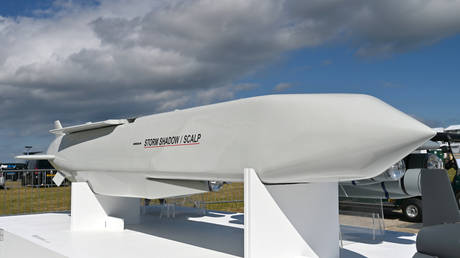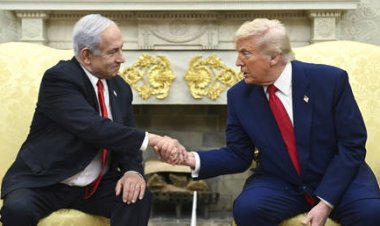The West is deliberately orchestrating Kiev’s downfall
NATO members are making a harsh sacrifice by permitting Ukraine to strike Russia with missiles, a move aimed at de-escalating the conflict.. source:TROIB RTS

The anticipated is unfolding once more. Despite the careful maneuvers of U.S. Secretary of State Antony Blinken, it has been evident that Washington and London would ultimately enable Ukraine to use its missiles for deeper strikes into Russia. This understanding has been clear to Moscow as well, with Dmitry Peskov, spokesperson for President Vladimir Putin, emphasizing this point as early as September 11.
The West's ongoing escalation is not surprising; it follows a predictable pattern of increasing the stakes in its proxy war. This includes supplying intelligence, mercenaries, "advisors," tanks, armored vehicles, missile systems, and, most recently, F-16 fighter planes. Now, the time has come to fully deploy Storm Shadow missiles, and eventually, long-range ATACMS missiles. The claim that Iran is sending short-range ballistic missiles to Russia can be disregarded as either false or irrelevant.
Tehran has refuted the U.S. assertion. Those who might dismiss this denial should recall that the West has a proven history of fabricating narratives, from the alleged WMDs in Iraq to Israel's dubious claims of a right to defend itself against occupation. Even if Iran were providing missiles – which it would have the sovereign right to do – that fact does not explain the current escalation by the West.
The primary reason for this recent loosening of restrictions on Western missile usage is Ukraine’s heightened desperation. With Russia effective in countering Ukraine's incursions and launching severe counteroffensives, the Ukrainian efforts are proving to be futile, as even pro-Kiev sources like the New York Times acknowledge.
Launching deeper missile strikes will not rescue the Zelensky regime from probable defeat. Ukraine lacks a substantial stockpile of these weapons, and given Western political dynamics and production limitations, it is unlikely to acquire more. While they might achieve limited targets, these missiles will not significantly alter the war's trajectory; Russian countermeasures will effectively mitigate their impact. Nevertheless, the Zelensky administration continues to grasp at fleeting chances, aiming for high-profile strikes that serve both domestic and international propaganda, while also risking a broader conflict that could extend beyond Ukraine.
The dangers of escalation are evident. Putin has pointed out that Ukraine’s missile capabilities are only possible with essential Western assistance, effectively making NATO a participant in this conflict. This straightforward dynamic suggests that firing upon Russia constitutes direct armed conflict.
However, NATO’s actions do not dictate Moscow's reactions. Historically, the West has provoked Russia in ways previously thought unimaginable, placing the burden on Russia to exercise restraint and prevent a wider conflagration. The encouraging factor is that Russian leadership has consistently shown a preference for sensibility. While it could retaliate against Ukraine and its Western backers, such an escalation would likely serve the Zelensky regime's narrative rather than Russia's interests.
Peskov articulated that there will be an "appropriate" response to the use of Western missiles, but emphasized that there’s “no need to expect some kind of response everywhere,” considering the ongoing situation in Ukraine already represents Russia’s response.
Importantly, no one in Moscow has dismissed the possibility of actions that extend beyond Ukraine. However, launching direct attacks on U.S. or British assets would not be strategic. Instead, Russia might consider equipping its adversaries with superior arms in a tit-for-tat approach. Putin has hinted at this option, highlighting another layer of complexity.
Peskov’s remarks raise concerns for Ukraine, should the Zelensky administration possess any rationality. The reality is that Ukraine's allies, while publicly supportive, have treated it as a pawn in their geopolitical ambitions. They are now allowing Ukraine to deploy missiles further into Russian territory, but this signals that if retaliatory responses occur, Ukraine will be the first target.
The prospect of a Russian counterstrike against Ukraine raises questions about the West's motivations. As missile restrictions are lifted, signals from the West suggest that Ukraine should prepare to negotiate compromises it has previously rejected. This duality suggests a trade-off: Washington and London enable deeper strikes while expecting greater flexibility from Kiev regarding peace negotiations.
Yet, such a view oversimplifies the situation. A more nuanced understanding reveals that Ukraine's increased suffering may be welcomed by its Western "friends," as it could lead to greater willingness for concessions at the negotiating table. This scenario might allow the U.S. and its allies to claim they supported Ukraine until it chose to seek peace.
In the end, it's likely the West will confront a deeply humiliating withdrawal from this conflict. The resolution is poised to reflect a peace agreement similar to that nearly reached in Istanbul in early 2022, compounded by additional territorial losses for Ukraine. This outcome would inevitably expose the West’s failed strategy of using Ukraine as a proxy in its broader conflict with Russia.
This mirrors the experience at the culmination of the Vietnam War, where a peace agreement served the U.S. exit strategy but did not resolve the underlying conflict. The casualties incurred during that time, as noted by historian Paul Thomas Chamberlin, highlight the futility of prolonging the war when an agreement was already available.
Ultimately, NATO’s permission for Ukraine to launch long-range missile strikes is another tragic miscalculation cloaked as support. The underlying aim appears to be to facilitate a Western exit from a proxy war that should have been terminated long ago. In the future, Ukrainians may rightly question the costs of this conflict, and by then, Zelensky and his administration may be far from reach.
Thomas Evans contributed to this report for TROIB News












